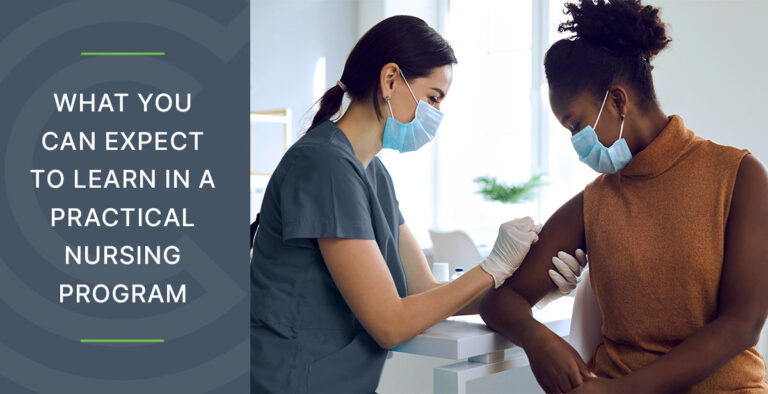You might be wondering what the training and education looks like in a practical nursing program. In this latest blog, we will provide you with information about what you can anticipate learning about our Practical Nursing program.
Overview of Practical Nursing Programs
Depending on the length and type of program, practical nursing programs typically cover a wide range of topics and can be anywhere from 12 months to 2 years on average. Students are trained to learn skills such as patient assessment, medication administration, wound care, and patient communication.
Required Courses and Curriculum
The Practical Nurse program curriculum is also designed to provide students with a foundation in nursing theory and will usually include some clinical practice. Some of the required courses may include anatomy, physiology, pharmacology, and the fundamentals of patient care.
Clinical Experience and Hands-On Learning
Clinical experience and hands-on learning are necessary components of a practical nursing program. Students have the opportunity to apply the knowledge and skills they learn in a real-world setting, working alongside healthcare professionals in hospitals, clinics, and other healthcare facilities during externships. This hands-on experience allows students to gain practical experience performing various nursing tasks, such as taking vital signs, administering medications, starting IV drips or giving injections, and providing patient care.
Professional Development and Soft Skills Training
In addition to the technical knowledge acquired in a practical nursing program, students also receive training in professional development and soft skills. These enable nurses to effectively communicate with patients and work collaboratively with colleagues such as registered nurses and doctors. Professional development focuses on honing skills such as time management, critical thinking, and problem-solving, while soft skills training emphasizes interpersonal skills, empathy, and emotional intelligence.
Certification and Licensing Requirements
To become a Licensed Practical Nurse (LPN), individuals must meet certain certification and licensing requirements. These requirements vary by state but typically include completing an approved practical nursing program and passing the National Council Licensure Examination for Practical Nurses (NCLEX-PN). Additionally, some states may require LPNs to pass a background check and submit fingerprints for licensure. It’s important for aspiring LPNs to research and understand the specific requirements in their state, as meeting these requirements is essential for practicing as a licensed practical nurse.
Job Outlook and Career Opportunities in Practical Nursing
Practical nursing offers a wide range of job opportunities in various healthcare settings. As the demand for nursing professionals continues to grow, the job outlook for practical nurses appears favorable. According to the Bureau of Labor Statistics, there are approximately 58,800 openings annually for practical nurses. The average annual wage for Practical Nurses is $48,070, making it an interesting profession to entire the realm of healthcare.
If you’re looking for a future with growth potential, try exploring the possibilities of pursuing a career as a practical nurse. The next step is to find a place to get your practical nurse training. With flexible schedules and an accelerated 12-month program, Caris College is a great place to start your future in practical nursing. Our team of dedicated instructors will be with you every step of the way and with a 506-hour clinical externship rotation, you’ll get the comprehensive training you need to excel! Contact us today to learn more or to schedule a campus tour.
More on a nursing program
